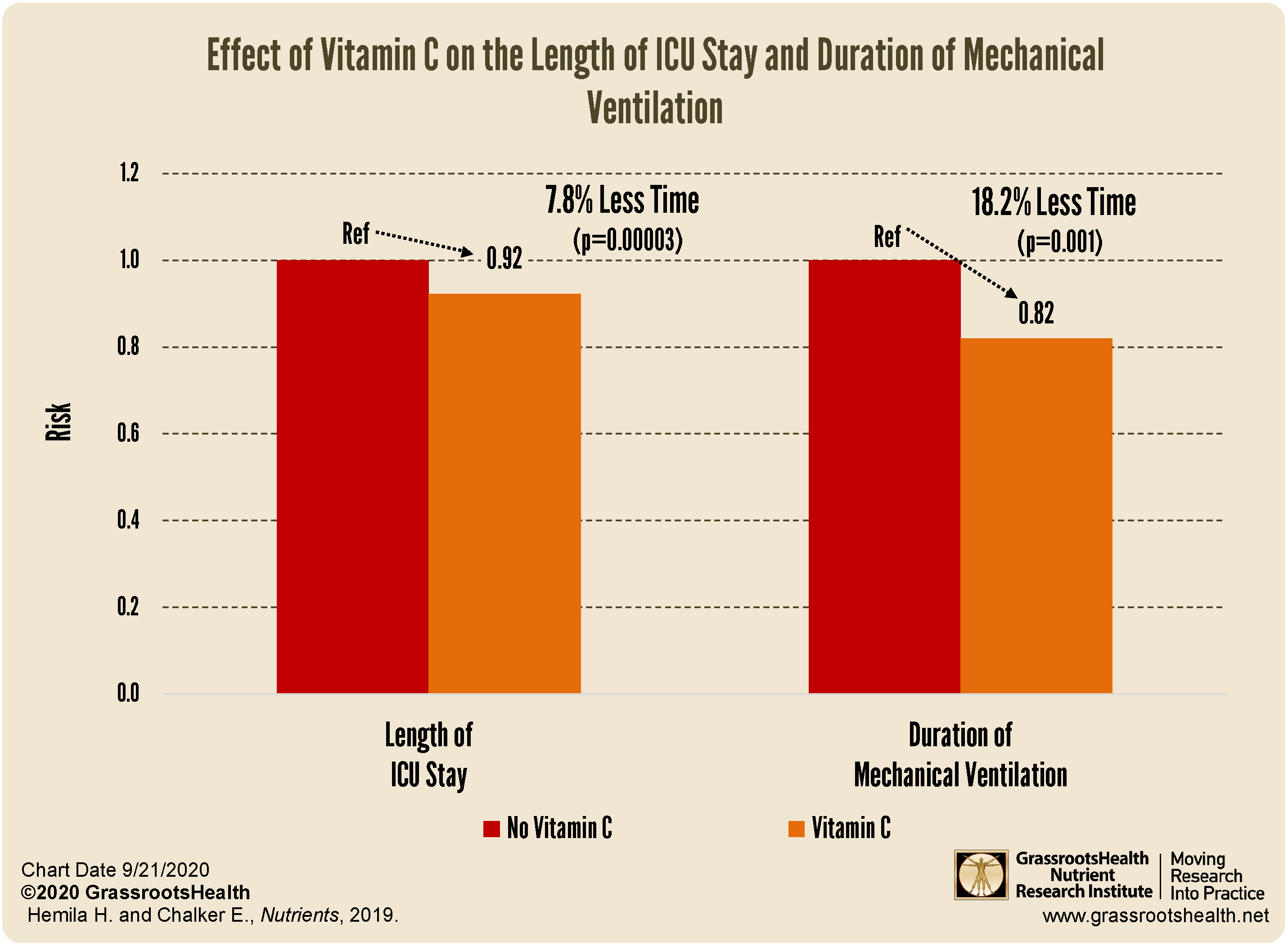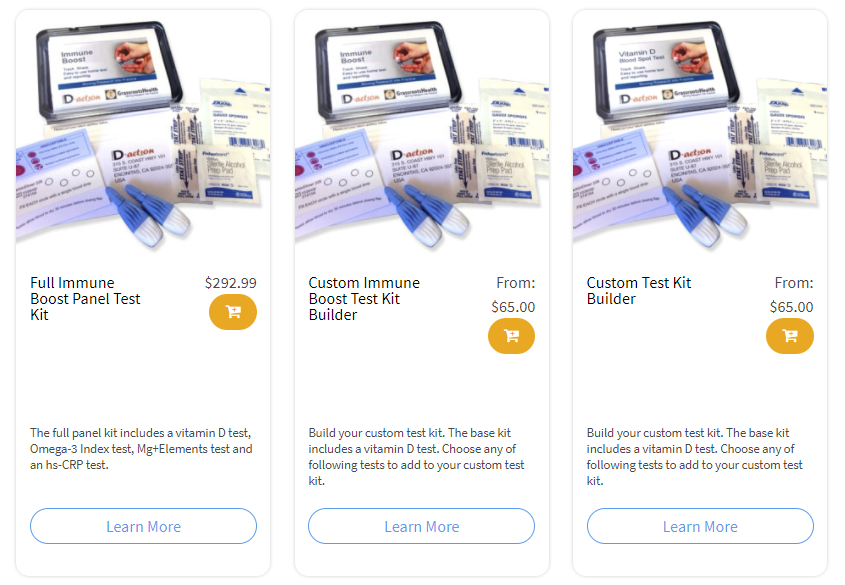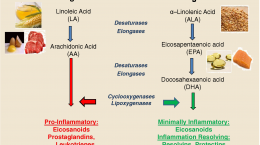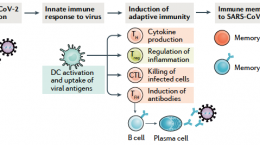Published on September 30, 2020
Many actions of vitamin C promote quicker recovery and a stronger immune response overall
Vitamin C is a popular immune-boosting nutrient, well known for decades to help fight infections such as the flu and the common cold. One of the major roles of vitamin C is as an antioxidant, protecting cells of the immune system from damage due to oxidative stress during an infection. Other functions of vitamin C within the immune system are to help increase phagocytic activity, T cell and B cell differentiation and proliferation, and antibody production.
Other Actions of Vitamin C to Increase Recovery Rates
Several other actions of vitamin C aid in recovery from infection, disease, injuries, and more, including:
- Assists in collagen metabolism to promote healing from wounds and trauma
- Participates in the synthesis of certain hormones, neuropeptides and neurotransmitters
- Affects physiological processes in endothelial function, the nervous system (including pain sensation), and the functioning of the heart
A wide variety of symptoms are involved in vitamin C deficiency including depression and anxiety, anemia, bleeding, slow wound healing, joint pain, and increased incidence of infections.
Meta-analysis Shows Effect of Vitamin C on Duration of Mechanical Ventilation and ICU Stays
A meta-analysis by Hemila and Chalker looked at 18 controlled trials involving 2004 patients to see whether vitamin C had any effect on the length of intensive care unit (ICU) stay and duration of mechanical ventilation. Several trials included cardiac surgery patients, while others involved patients with sepsis, lung trauma, and severe burns. All trials included a vitamin C group and a control group, where vitamin C administration (of various doses and durations, administered orally and intravenously) was the only difference between groups.
When analyzing the data, the authors found the following:
- Length of ICU stay was reduced by an average of 7.8% with vitamin C (12 trials, 1766 patients, p=0.00003)
- Length of ICU stay was reduced by 8.6% for patients given 1-3 g/day of oral vitamin C (6 trials, 927 patients, p=0.003)
- Duration of mechanical ventilation for patients needing at least 24 hours of ventilation (those who were more severely ill) was shortened by 18.2% among patients given vitamin C (3 trials, 250 patients, p=0.001)
The study authors conclude that, while their findings that vitamin C can shorten the length of ICU stays are statistically highly significant, additional comparisons should be considered to further evaluate the dose-response relationship and the difference between oral and intravenous administration.
How safe is vitamin C?
Vitamin C supplementation is extremely safe. Doses of vitamin C up to 10 grams per day (10,000 mg/d) have been provided without causing any toxic or detrimental health effects. The tolerable upper intake level (UL) for vitamin C was set at 2,000 mg/d to prevent symptoms of diarrhea and gastrointestinal upset. These side effects can be minimized and absorption increased by dividing vitamin C doses over the course of a day and/or by gradually increasing the dose to bowel tolerance (increase the vitamin C dose by 500-1,000 mg/d until loose stools are encountered then reduce the dose slightly).
Better Results when Taken Together
Nutrients work synergistically in order to carry out specific functions within the body. For example, we have recently discussed how different immune cells rely on a variety of nutrients, including vitamins D, C, B6, B12, zinc, and magnesium, in order to carry out their actions in an immune response. Without these necessary nutrients, immune function may be hindered.
Could a nutrient deficiency be putting a damper on your immune response? Find out by testing your vitamin D, omega-3s, magnesium and other essential elements (including selenium), as well as your inflammation levels, with the new Immune Boost home test kit offered by GrassrootsHealth. Measuring levels is the only way to know if you are supporting your immune system and whether additional changes should be made, with supplementation, dietary changes, or both.
Enroll now with the Full Immune Boost Panel (which includes tests for vitamin D, Omega-3 Index, magnesium, zinc, selenium, copper, and hsCRP), and get 10% off when you use coupon code BoostTen at checkout.
What Does it Take YOU to Get Your D to 40 ng/ml (100 nmol/L)?
Did you know your health could be greatly affected by making sure you have a vitamin D level of at least 40 ng/ml (100 nmol/L)? Help us help you.
STEP 1 – Do you know what your vitamin D level is? If not, be sure to test today to find out.
STEP 2 – Determine your target level. Are you at your target level? Experts recommend a level of at least 40-60 ng/ml (100-150 nmol/L).
STEP 3 – Need to boost your level? Use the D*calculator to see how much vitamin D it may take to reach your target. Opt for the Loading Dose for a quicker boost.
STEP 4 – Optimize how your body absorbs and utilizes vitamin D with co-nutrients and these simple steps.
STEP 5 – Re-Test! This is an important step to make sure you have reached your target level, and to ensure you are not taking too much! Re-testing after 3-4 months is recommended.
STEP 6 – Adjust, Repeat…
Give your immune system the nutrients it needs to support a healthy you and protect yourself from unnecessary diseases, especially COVID-19.
NEWS ALERT
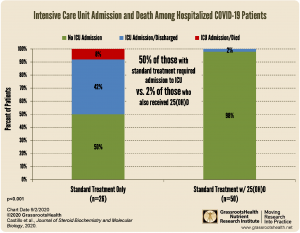 The first Randomized Controlled Trial on vitamin D and COVID-19 has shown a 96% lower risk of ICU admission for those receiving vitamin D (as 25(OH)D to quickly boost vitamin D blood levels) along with the standard treatment, compared to those receiving standard treatment alone.
The first Randomized Controlled Trial on vitamin D and COVID-19 has shown a 96% lower risk of ICU admission for those receiving vitamin D (as 25(OH)D to quickly boost vitamin D blood levels) along with the standard treatment, compared to those receiving standard treatment alone.
These results support many previous observational studies showing a relationship between vitamin D levels and intake and COVID-19 severity.
Review the Latest Nutrient Research for COVID-19
GrassrootsHealth Nutrient Research Institute has launched the new Immune Boost project with the use of our myData-myAnswers nutrient health system that nearly 15,000 people are already using for their health. Specific markers that influence immune health are suggested for testing as part of this project including:
- Vitamin D
- Omega-3 Index
- Essential elements magnesium, selenium, and zinc
- hsCRP
Our goal is to demonstrate how one can use the Nutrient Research Model established by Dr. Robert Heaney to show the effect of vitamin D serum levels of at least 40 ng/ml (100 nmol/L) on risk reduction for all ethnicities in the population. Status and intake of other nutrients will also be analyzed for any type of relationship to immune status and symptom severity. Join the project today!
Please let us know if you’re interested in helping sponsor this project.
CLICK HERE for updates and new information about the project.
Through GrassrootsHealth Nutrient Research Institute, you can also test your essential elements magnesium, copper, zinc and selenium, toxins such as lead, mercury and cadmium, as well as your omega-3 levels, inflammation levels and thyroid stimulating hormone (TSH) level. Find out your levels today! Log on to the test selection page (click the link below) to get your tests and see for yourself if your levels can be improved.
Make sure you track your results before and after, about every 6 months!
Click Here to Access the Test Page
How can I track my nutrient intake and levels over time?
To help you track your supplement use and nutrient levels, GrassrootsHealth has created the Personal Health Nutrient Decision System called
For each specific supplement, you can track what days you take it, how much, and many other details. This will help you know your true supplemental intake and what patterns of use work for you to reach and maintain optimum nutrient levels. Check it out today!


